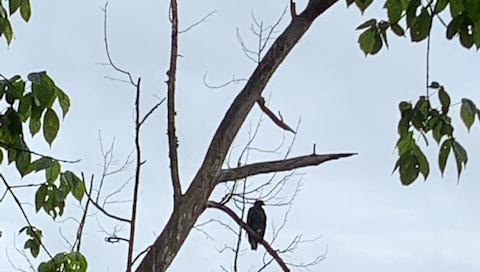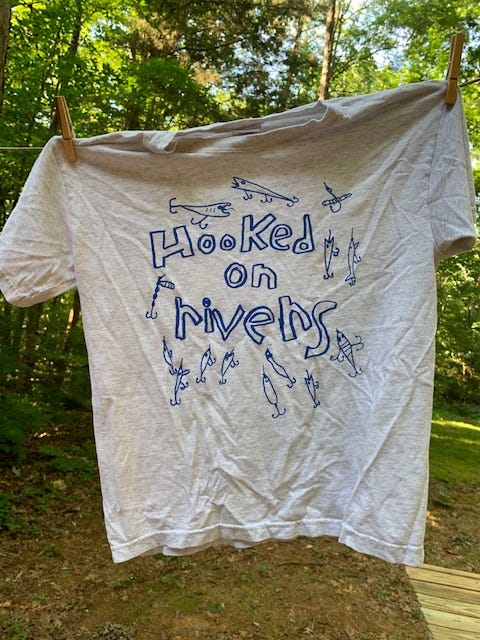(juvenile bald eagle above the Haw)
Tomorrow I’ll begin teaching an eight-week class (for Orion) on writing nonfiction with urgency. One of the things we’ll practice in our class is developing a writing practice that accommodates writing with imperfection, but also emotional rigor, about things as they happen. We’ll also work on identifying and making room for the writing that is the most important to us.
Usually, urgency is not how I approach my writing. I save urgency for other things: work, email, emergencies, making sure we have enough popsicles/coffee/cat food/etc. in the house. That’s not to say that writing is unimportant—aside from my family, it is the most important thing for me. But unless I have a deadline, I prefer to work slowly, building my characters (if I’m writing fiction) and what I have to say over time. I developed this habit in my years as a K-12 teacher—I didn’t have time or energy to write every day. During the school year I mostly took notes, and thought and read, until winter and summer break, and then I’d write a lot. I took comfort and inspiration from the story that Edward P. Jones told about how he thought about, but didn’t write, The Known World for about ten years while working at Tax Notes. Then, when he was laid off, he used his severance time to draft it in just a few months.
He was writing with urgency then, for sure, but it felt more to me like what he’d thought about and imagined was spilling out of him, onto the page. I took inspiration, too, from writers of nonfiction who took about ten years to write their important books—Isabel Wilkerson’s The Warmth of Other Suns, or Adrian Nicole LeBlanc’s Random Family. Ten years began to feel like a kind of magic number for writing something truly great.
Like me, a lot of the other writers in my class are writing about the environment—I haven’t “met” them yet (we will meet over Zoom), but from our emails I get the feeling that they are also experiencing the urgency of things actively—exponentially—getting worse, environmentally, year by year, month by month, even day by day. Some of these writers also have young children, which compounds and complicates this feeling. We want to enjoy our time with our children (some of us have been at home with them 24/7 for many months now), but we are also terrified of the world that they are inheriting. We know that we don’t really even have ten years.
Urgency + kids. That’s why I started the Frog Trouble Times, which is not a book or a finished product or a thing without errors. I look back at my posts sometimes and wince at typos, language that isn’t smooth, things I left out. But I feel pretty good about the fact that we have actually stuck to a three-times-a-week publication schedule for more than a whole month (we started on Earth Day). I’m also happy that Bea has an outlet for her witchiness and love of nature (we decided yesterday that we need calling cards to hand out to people, which we are planning to make today).
The newsletter idea actually came about from my time in K-12 teaching. Whenever I’ve had a classroom of young kids, we’ve made a newsletter—written articles, printed it out, distributed to other classes. How much work was a newsletter for me (getting a room of fifth graders on task, putting it together, proofreading), how much chaos did it sometimes create as we were making it? Quite a lot, but at the end of the day, we had this thing to look at, to read ourselves and share, and to feel proud that we had done. Maybe most importantly (for me), I had a thing that reminded me of each child and what they cared about.
Having more time at home this past year has been a big opportunity to learn—about practical things like foraging for mushrooms and bread-baking and frog-growing, but also harder-to-quantify things, like letting true urgency replace accomplishment, what things I really do not want to do any more (I think I may never go to Southpoint Mall again!), and the value of collaboration, which is something I’ll write a little more about later.
I wish that we had started the FTT a year ago, but we didn’t, and that’s fine. We have it now, and we’re going to try to keep it up. I’m excited to meet my class tomorrow. I think on Tuesday (in the FTT) we’ll post something about calling cards for kids—or maybe outdoor running games. We’ll see what feels most urgent.
(I don’t have copies of the newspapers my 5th grade class made, but this is still my favorite T-shirt. Owen, who loved fishing with his dad, drew it, and we screenprinted a bunch for a fundraiser.)
A joke from Bea:
Q: How do you know the ocean is friendly?
A: It waves!
I’m curious: has the pandemic increased a sense of urgency for you? Have you had any feelings of reset or clarity, after being at home for a year? How are you dealing with that now, as things reopen somewhat?






I love this post, and it's gotten me thinking about what numbs my sense of urgency. What is the opposite of urgency? There is something within me that willfully ignores what is most urgent in my life until it's inescapable. And that kind of denial, or willful blindness, can infect a whole life, corrupting my clarity about other, seemingly unrelated issues.
This post has awakened something in me I thought had vanished permanently. Thank you for the "permission slip" to come back to center, Belle and Bea.